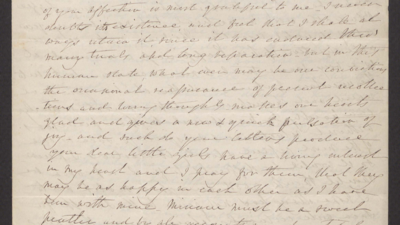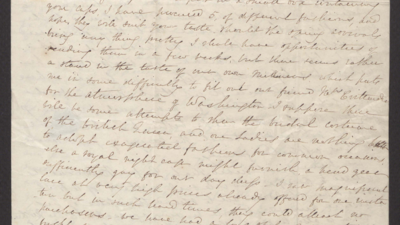Oral History Interview with Fred Stamm
Title
Date
Contributor
Summary
Born in Wrexen, Germany, in 1919, Fred Stamm was one of four children. Their father was a poor cattle dealer. Fred describes his limited early education in a Jewish school in Warburg and in the local Gymnasium, from 1930 until 1933, when a Nazi decree forced Jewish students out. His two sisters were transferred from Jewish to Catholic school, protected by the nuns.
He illustrates the effect of pre-war Nazi influence in Wrexen. His grandmother befriended villagers with clothing and bedding after a disastrous flood, but at her funeral in 1934 her casket was stoned by village youths. Fred served as an apprentice with a cabinet maker until 1938, when he was forced into a Jewish labor unit.
During the night of November 9, 1938, strangers broke into the Stamm house, ransacking the ground floor while the family, in bed upstairs, was unmolested. The next morning, Fred and his brother were advised to leave town and ride the railroads for several days. When they returned they found all the males in the town, except their ill father, were taken to a concentration camp. Most of them later returned home.
Within the next few months, both brothers left Germany for the United States, sponsored by their cousin, a gynecologist in Philadelphia where Fred quickly found work repairing furniture.
In 1942, Fred and his brother served in the United States Army even though they were considered German enemy aliens. He served in the Air Force as an aircraft mechanic, and refused European duty until granted American citizenship. He was sent to China with a fighter squadron to bomb Japanese-occupied territories. Fred returned to Philadelphia, married, raised two children and became a student of Jewish history at Gratz College.
See also the testimony of his wife, Ilse Stamm.
Interviewee: Fred Stamm Dater: June 1980
none
More Sources Like This
of
Daniel Goldsmith
Daniel Goldsmith was born in Antwerp, Belgium on December 11, 1931 to Polish parents. His family was orthodox and he was educated at a Yeshiva. They lived in Antwerp under German occupation and suffered under the ever-increasing anti-Jewish measures. His father was transported to a labor camp in France, August 1942 and never heard from again.
His mother, Ruchel Goldschmidt – who was in contact with the Belgian underground – managed to get some money, safeguard their possessions, and find a hiding place just before and while the Germans raided their neighborhood and ransacked Jewish-owned houses, helped by Belgians who pointed out Jewish residents. Daniel cites several instances when Belgians cooperated with the Germans. He also gives many examples of aid by non-Jewish Belgians, especially Father André (who was recognized as a “Righteous Gentile”) and other Catholic clergy and nuns. He also mentions his mother’s work with the underground.
Daniel and his sister were placed in a convent in December 1942, then with Christian families after their mother found out the Germans were going to enter the convent to look for Jewish children. He was in a succession of orphanages in Weelde and Mechelen, run by Father Cornelissen, from 1943 to 1944, while his sister lived with another Christian family. Daniel got false baptismal papers, changed his name, lived as a Catholic, but refused to convert.
In May 1944 the Germans imprisoned all circumcised boys in the orphanage, then transported them on cattle cars with other Jewish children. Daniel and several other boys escaped from the moving train and managed to contact a priest who placed each of them with a different Christian family who hid them. Monsieur and Madame Botier, hid Daniel, were kind to him, and worked to reunite him with his mother after liberation in September 1944.
Daniel describes various placements post liberation, especially in AischeEnRefail; mentions a French committee that collected hidden Jewish children, and Aliyah Bet. His mother was injured during an air raid and could not take care of her children at that time. He relates how difficult and painful it was for all parties, especially his sister, when his mother wanted to reclaim her daughter from the Christian family that sheltered her for three years.
In April 1948, Daniel, his mother and his sister went to the United States from Belgium, sponsored by his father’s family. He talks about his family’s life shortly after they arrived, and his own life from that time to the present.
of
Myra Davis
Myra Davis, nee Miki Heller, was born July 12, 1936 in Kovno, Lithuania, the only child in an affluent Jewish family. Her parents were Franz and Fanny Heller. After the Russian invasion in 1940, her family was forced to move from their large home to much smaller quarters. In 1940, they immigrated to Japan with transit visas and visas for Curacao, which were not used. Instead, they went to Shanghai, in 1941, after a year in Kobe, Japan, where Myra attended a French Catholic school.
In the French quarter of Shanghai, they lived comfortably until the Japanese occupation forced them into the Hongkew Ghetto. Her father, despondent about their impoverishment, committed suicide. When the war ended, her mother worked for the American Army and met a Jewish colonel, David Bare (phonetic), whom she married in 1947. The family lived in Beijing, China, Linz, Austria and South Carolina, United States. Myra became a translator for the American government, married Arnold Davis and they live with their two children in Boca Raton, Florida.
Recorded at the Rickshaw Reunion - a meeting in October 1999 at the Holiday Inn in Philadelphia of refugees who found refuge in Shanghai during World War II.
of
Henry Altschuler
Henry Altschuler was born March 28, 1923 in Jaroslaw, Poland. He was educated at both cheder and public school where he experienced some antisemitism. He talks about Jewish life in pre-war Poland and resistance to local pogroms. He describes his flight to Rovno in the Ukraine with his father because a policemen warned him to escape the invading Germans. After a brief return to Jaroslaw, he escaped to Chrobieszuw. He describes life in the Russian occupied zone and after the German invasion in June 1941.
He was in Jaktorów concentration camp from 1941 to 1942. His mother ransomed him helped by the Judenrat but he was caught and rearrested later. Together with his family he was moved into the Lubaczów Ghetto. His family perished but he escaped and went into hiding with a Polish family until he was caught and sent to a work camp in Lemberg. He escaped, was caught again and put into a death cell at Locki prison with two former “Kommando 1008” Jews where he witnessed many murders. About to be executed, he was reprieved and was transferred to the destroyed Lemberg labor camp where all incoming Jews were executed and he was almost beaten to death. He also was in Plaszow camp (near Krakow) for six months. He talks about all of these experiences in great detail with many vignettes.
He was liberated by Russians in 1945, returned to Lemberg and emigrated to the United States from Germany, in September, 1949.
He describes lasting emotional and physical effects of his experiences. Throughout the interview he cites many instances of brutality, of Polish and Ukrainian co-operation with the Germans, as well as several times when he was helped by non-Jews, and some attempts at resistance.
of
Philip Bonner
Mr. Bonner of the 159th Engineer Batallion, 3rd and 9th Army, saw combat in Normandy, Brittany, the Battle of the Bulge, and Germany. He mentions atrocities committed by Germans against French resistance fighters. He arrived in Buchenwald on April 17, 1945, several hours after its liberation. He describes conditions at Buchenwald, piles of bodies, evidence of mass cremations, semi-starved condition of survivors, their reaction to the liberators, as well as harmful effect of giving survivors their rations.
He relates the rest of his war experiences, including encounters with German soldiers and civilians. Post-war, his unit built a camp in Antwerp, Belgium housing German prisoners of war. He expresses his thoughts about the causes of Hitler’s rise to power, and Germany’s role in World War II and the Holocaust. He hopes that his testimony will prevent future Holocausts.

